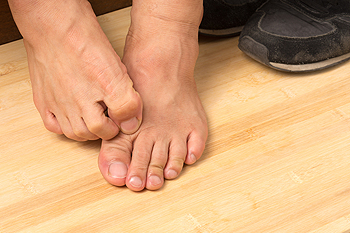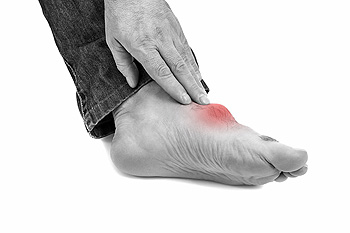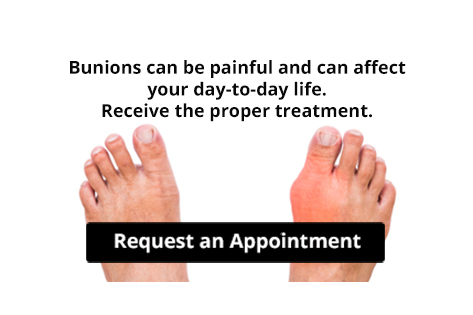Connect With Us
Items filtered by date: April 2020
Preventing Possible Foot Conditions by Practicing Proper Foot Care
 Maintaining everyday foot care is essential in keeping the feet healthy. It is helpful to measure children’s feet frequently, as this will help in determining what the correct size shoe your child needs. As the feet grow, it is beneficial to wear shoes that have adequate room for the toes to move freely in. This can help to prevent uncomfortable foot conditions from developing which may include bunions and hammertoes. If there are existing medical conditions such as diabetes, it is important to be aware of any cuts, scrapes, or bruises that may be on the feet. Additionally, when the toenails are trimmed, cutting them in a straight line can possibly prevent ingrown toenails from developing. If you would like additional information about the importance of daily foot care, please consult with a podiatrist.
Maintaining everyday foot care is essential in keeping the feet healthy. It is helpful to measure children’s feet frequently, as this will help in determining what the correct size shoe your child needs. As the feet grow, it is beneficial to wear shoes that have adequate room for the toes to move freely in. This can help to prevent uncomfortable foot conditions from developing which may include bunions and hammertoes. If there are existing medical conditions such as diabetes, it is important to be aware of any cuts, scrapes, or bruises that may be on the feet. Additionally, when the toenails are trimmed, cutting them in a straight line can possibly prevent ingrown toenails from developing. If you would like additional information about the importance of daily foot care, please consult with a podiatrist.
Everyday foot care is very important to prevent infection and other foot ailments. If you need your feet checked, contact one of our podiatrists from The Podiatry Center, PC. Our doctors can provide the care you need to keep you pain-free and on your feet.
Everyday Foot Care
Often, people take care of their bodies, face and hair more so than they do for their feet. But the feet are a very important aspect of our bodies, and one that we should pay more attention to. Without our feet, we would not be able to perform most daily tasks.
It is best to check your feet regularly to make sure there are no new bruises or cuts that you may not have noticed before. For dry feet, moisturizer can easily be a remedy and can be applied as often as necessary to the affected areas. Wearing shoes that fit well can also help you maintain good foot health, as well as making it easier to walk and do daily activities without the stress or pain of ill-fitting shoes, high heels, or even flip flops. Wearing clean socks with closed shoes is important to ensure that sweat and bacteria do not accumulate within the shoe. Clean socks help to prevent Athlete’s foot, fungi problems, bad odors, and can absorb sweat.
If you have any questions please feel free to contact our office located in Millburn, NJ. We offer the newest diagnostic and treatment technologies for all your foot and ankle needs.
Read more about Everyday Foot CarePreventing Possible Foot Conditions by Practicing Proper Foot Care
 Maintaining everyday foot care is essential in keeping the feet healthy. It is helpful to measure children’s feet frequently, as this will help in determining what the correct size shoe your child needs. As the feet grow, it is beneficial to wear shoes that have adequate room for the toes to move freely in. This can help to prevent uncomfortable foot conditions from developing which may include bunions and hammertoes. If there are existing medical conditions such as diabetes, it is important to be aware of any cuts, scrapes, or bruises that may be on the feet. Additionally, when the toenails are trimmed, cutting them in a straight line can possibly prevent ingrown toenails from developing. If you would like additional information about the importance of daily foot care, please consult with a podiatrist.
Maintaining everyday foot care is essential in keeping the feet healthy. It is helpful to measure children’s feet frequently, as this will help in determining what the correct size shoe your child needs. As the feet grow, it is beneficial to wear shoes that have adequate room for the toes to move freely in. This can help to prevent uncomfortable foot conditions from developing which may include bunions and hammertoes. If there are existing medical conditions such as diabetes, it is important to be aware of any cuts, scrapes, or bruises that may be on the feet. Additionally, when the toenails are trimmed, cutting them in a straight line can possibly prevent ingrown toenails from developing. If you would like additional information about the importance of daily foot care, please consult with a podiatrist.
Everyday foot care is very important to prevent infection and other foot ailments. If you need your feet checked, contact one of our podiatrists from The Podiatry Center, PC. Our doctors can provide the care you need to keep you pain-free and on your feet.
Everyday Foot Care
Often, people take care of their bodies, face and hair more so than they do for their feet. But the feet are a very important aspect of our bodies, and one that we should pay more attention to. Without our feet, we would not be able to perform most daily tasks.
It is best to check your feet regularly to make sure there are no new bruises or cuts that you may not have noticed before. For dry feet, moisturizer can easily be a remedy and can be applied as often as necessary to the affected areas. Wearing shoes that fit well can also help you maintain good foot health, as well as making it easier to walk and do daily activities without the stress or pain of ill-fitting shoes, high heels, or even flip flops. Wearing clean socks with closed shoes is important to ensure that sweat and bacteria do not accumulate within the shoe. Clean socks help to prevent Athlete’s foot, fungi problems, bad odors, and can absorb sweat.
If you have any questions please feel free to contact our office located in Millburn, NJ . We offer the newest diagnostic and treatment technologies for all your foot and ankle needs.
Are Bunions Affecting Your Everyday Life?
Are Bunions Affecting Your Everyday Life?
How Is PAD Diagnosed?
 There are common symptoms that many patients experience with peripheral artery disease (PAD). These can include cramping in the legs and feet while walking or exercising, foot wounds that have difficulty healing, and coldness in the feet. This condition can develop as a result of blocked arteries, and cramps are the body’s natural warning method of having inadequate blood flow. A proper diagnosis may include having a test performed that can check the blood pressure in the feet, which can be compared to the blood pressure in the arm. If there is an abnormal difference between the two, additional testing may be performed. If you feel you have symptoms of PAD, it is suggested that you schedule a consultation with a podiatrist who can properly diagnose and treat this condition.
There are common symptoms that many patients experience with peripheral artery disease (PAD). These can include cramping in the legs and feet while walking or exercising, foot wounds that have difficulty healing, and coldness in the feet. This condition can develop as a result of blocked arteries, and cramps are the body’s natural warning method of having inadequate blood flow. A proper diagnosis may include having a test performed that can check the blood pressure in the feet, which can be compared to the blood pressure in the arm. If there is an abnormal difference between the two, additional testing may be performed. If you feel you have symptoms of PAD, it is suggested that you schedule a consultation with a podiatrist who can properly diagnose and treat this condition.
Peripheral artery disease can pose a serious risk to your health. It can increase the risk of stroke and heart attack. If you have symptoms of peripheral artery disease, consult with one of our podiatrists from The Podiatry Center, PC. Our doctors will assess your condition and provide you with quality foot and ankle treatment.
Peripheral artery disease (PAD) is when arteries are constricted due to plaque (fatty deposits) build-up. This results in less blood flow to the legs and other extremities. The main cause of PAD is atherosclerosis, in which plaque builds up in the arteries.
Symptoms
Symptoms of PAD include:
- Claudication (leg pain from walking)
- Numbness in legs
- Decrease in growth of leg hair and toenails
- Paleness of the skin
- Erectile dysfunction
- Sores and wounds on legs and feet that won’t heel
- Coldness in one leg
It is important to note that a majority of individuals never show any symptoms of PAD.
Diagnosis
While PAD occurs in the legs and arteries, Podiatrists can diagnose PAD. Podiatrists utilize a test called an ankle-brachial index (ABI). An ABI test compares blood pressure in your arm to you ankle to see if any abnormality occurs. Ultrasound and imaging devices may also be used.
Treatment
Fortunately, lifestyle changes such as maintaining a healthy diet, exercising, managing cholesterol and blood sugar levels, and quitting smoking, can all treat PAD. Medications that prevent clots from occurring can be prescribed. Finally, in some cases, surgery may be recommended.
If you have any questions, please feel free to contact our office located in Millburn, NJ. We offer the newest diagnostic and treatment technologies for all your foot care needs.
Read more about Peripheral Artery DiseaseHow Is PAD Diagnosed?
 There are common symptoms that many patients experience with peripheral artery disease (PAD). These can include cramping in the legs and feet while walking or exercising, foot wounds that have difficulty healing, and coldness in the feet. This condition can develop as a result of blocked arteries, and cramps are the body’s natural warning method of having inadequate blood flow. A proper diagnosis may include having a test performed that can check the blood pressure in the feet, which can be compared to the blood pressure in the arm. If there is an abnormal difference between the two, additional testing may be performed. If you feel you have symptoms of PAD, it is suggested that you schedule a consultation with a podiatrist who can properly diagnose and treat this condition.
There are common symptoms that many patients experience with peripheral artery disease (PAD). These can include cramping in the legs and feet while walking or exercising, foot wounds that have difficulty healing, and coldness in the feet. This condition can develop as a result of blocked arteries, and cramps are the body’s natural warning method of having inadequate blood flow. A proper diagnosis may include having a test performed that can check the blood pressure in the feet, which can be compared to the blood pressure in the arm. If there is an abnormal difference between the two, additional testing may be performed. If you feel you have symptoms of PAD, it is suggested that you schedule a consultation with a podiatrist who can properly diagnose and treat this condition.
Peripheral artery disease can pose a serious risk to your health. It can increase the risk of stroke and heart attack. If you have symptoms of peripheral artery disease, consult with one of our podiatrists from The Podiatry Center, PC. Our doctors will assess your condition and provide you with quality foot and ankle treatment.
Peripheral artery disease (PAD) is when arteries are constricted due to plaque (fatty deposits) build-up. This results in less blood flow to the legs and other extremities. The main cause of PAD is atherosclerosis, in which plaque builds up in the arteries.
Symptoms
Symptoms of PAD include:
- Claudication (leg pain from walking)
- Numbness in legs
- Decrease in growth of leg hair and toenails
- Paleness of the skin
- Erectile dysfunction
- Sores and wounds on legs and feet that won’t heal
- Coldness in one leg
It is important to note that a majority of individuals never show any symptoms of PAD.
Diagnosis
While PAD occurs in the legs and arteries, Podiatrists can diagnose PAD. Podiatrists utilize a test called an ankle-brachial index (ABI). An ABI test compares blood pressure in your arm to you ankle to see if any abnormality occurs. Ultrasound and imaging devices may also be used.
Treatment
Fortunately, lifestyle changes such as maintaining a healthy diet, exercising, managing cholesterol and blood sugar levels, and quitting smoking, can all treat PAD. Medications that prevent clots from occurring can be prescribed. Finally, in some cases, surgery may be recommended.
If you have any questions, please feel free to contact our office located in Millburn, NJ . We offer the newest diagnostic and treatment technologies for all your foot care needs.
What Is The Common Age Group That Is Affected By Gout?
 The painful foot condition that is known as gout typically occurs in men who are between forty and fifty years old. There may be existing factors that can lead to the formation of gout. These can consist of genetic factors, being overweight, and consuming foods that are rich in purines. Additionally, people who have high blood pressure, thyroid conditions, or kidney failure may be susceptible to developing gout. It occurs as a result of excess uric acid in the bloodstream and can cause sensations that resemble crystals attacking the joints in the feet and hands. Common symptoms often include extreme pain and discomfort in the big toe and surrounding area, and it may become difficult to walk. If you are afflicted with gout attacks, it is strongly advised that you are under the care of a podiatrist who can properly treat this condition.
The painful foot condition that is known as gout typically occurs in men who are between forty and fifty years old. There may be existing factors that can lead to the formation of gout. These can consist of genetic factors, being overweight, and consuming foods that are rich in purines. Additionally, people who have high blood pressure, thyroid conditions, or kidney failure may be susceptible to developing gout. It occurs as a result of excess uric acid in the bloodstream and can cause sensations that resemble crystals attacking the joints in the feet and hands. Common symptoms often include extreme pain and discomfort in the big toe and surrounding area, and it may become difficult to walk. If you are afflicted with gout attacks, it is strongly advised that you are under the care of a podiatrist who can properly treat this condition.
Gout is a painful condition that can be treated. If you are seeking treatment, contact one of our podiatrists from The Podiatry Center, PC. Our doctors will treat your foot and ankle needs.
What Is Gout?
Gout is a form of arthritis that is characterized by sudden, severe attacks of pain, redness, and tenderness in the joints. The condition usually affects the joint at the base of the big toe. A gout attack can occur at any random time, such as the middle of the night while you are asleep.
Symptoms
- Intense Joint Pain - Usually around the large joint of your big toe, and it most severe within the first four to twelve hours
- Lingering Discomfort - Joint discomfort may last from a few days to a few weeks
- Inflammation and Redness -Affected joints may become swollen, tender, warm and red
- Limited Range of Motion - May experience a decrease in joint mobility
Risk Factors
- Genetics - If family members have gout, you’re more likely to have it
- Medications - Diuretic medications can raise uric acid levels
- Gender/Age - Gout is more common in men until the age of 60. It is believed that estrogen protects women until that point
- Diet - Eating red meat and shellfish increases your risk
- Alcohol - Having more than two alcoholic drinks per day increases your risk
- Obesity - Obese people are at a higher risk for gout
Prior to visiting your podiatrist to receive treatment for gout, there are a few things you should do beforehand. If you have gout you should write down your symptoms--including when they started and how often you experience them, important medical information you may have, and any questions you may have. Writing down these three things will help your podiatrist in assessing your specific situation so that he or she may provide the best route of treatment for you.
If you have any questions, please feel free to contact our office located in Millburn, NJ. We offer the newest diagnostic and treatment technologies for all your foot care needs.
Read more about Everything You Need to Know About GoutWhat Is The Common Age Group That Is Affected By Gout?
 The painful foot condition that is known as gout typically occurs in men who are between forty and fifty years old. There may be existing factors that can lead to the formation of gout. These can consist of genetic factors, being overweight, and consuming foods that are rich in purines. Additionally, people who have high blood pressure, thyroid conditions, or kidney failure may be susceptible to developing gout. It occurs as a result of excess uric acid in the bloodstream and can cause sensations that resemble crystals attacking the joints in the feet and hands. Common symptoms often include extreme pain and discomfort in the big toe and surrounding area, and it may become difficult to walk. If you are afflicted with gout attacks, it is strongly advised that you are under the care of a podiatrist who can properly treat this condition.
The painful foot condition that is known as gout typically occurs in men who are between forty and fifty years old. There may be existing factors that can lead to the formation of gout. These can consist of genetic factors, being overweight, and consuming foods that are rich in purines. Additionally, people who have high blood pressure, thyroid conditions, or kidney failure may be susceptible to developing gout. It occurs as a result of excess uric acid in the bloodstream and can cause sensations that resemble crystals attacking the joints in the feet and hands. Common symptoms often include extreme pain and discomfort in the big toe and surrounding area, and it may become difficult to walk. If you are afflicted with gout attacks, it is strongly advised that you are under the care of a podiatrist who can properly treat this condition.
Gout is a painful condition that can be treated. If you are seeking treatment, contact one of our podiatrists from The Podiatry Center, PC. Our doctors will treat your foot and ankle needs.
What Is Gout?
Gout is a form of arthritis that is characterized by sudden, severe attacks of pain, redness, and tenderness in the joints. The condition usually affects the joint at the base of the big toe. A gout attack can occur at any random time, such as the middle of the night while you are asleep.
Symptoms
- Intense Joint Pain - Usually around the large joint of your big toe, and it most severe within the first four to twelve hours
- Lingering Discomfort - Joint discomfort may last from a few days to a few weeks
- Inflammation and Redness -Affected joints may become swollen, tender, warm and red
- Limited Range of Motion - May experience a decrease in joint mobility
Risk Factors
- Genetics - If family members have gout, you’re more likely to have it
- Medications - Diuretic medications can raise uric acid levels
- Gender/Age - Gout is more common in men until the age of 60. It is believed that estrogen protects women until that point
- Diet - Eating red meat and shellfish increases your risk
- Alcohol - Having more than two alcoholic drinks per day increases your risk
- Obesity - Obese people are at a higher risk for gout
Prior to visiting your podiatrist to receive treatment for gout, there are a few things you should do beforehand. If you have gout you should write down your symptoms--including when they started and how often you experience them, important medical information you may have, and any questions you may have. Writing down these three things will help your podiatrist in assessing your specific situation so that he or she may provide the best route of treatment for you.
If you have any questions, please feel free to contact our office located in Millburn, NJ . We offer the newest diagnostic and treatment technologies for all your foot care needs.
Are You Suffering From Ingrown Toenails?
Are You Suffering From Ingrown Toenails?
Blog Archives
- April 2025
- March 2025
- February 2025
- January 2025
- December 2024
- November 2024
- October 2024
- September 2024
- August 2024
- July 2024
- June 2024
- May 2024
- April 2024
- March 2024
- February 2024
- January 2024
- December 2023
- November 2023
- October 2023
- September 2023
- August 2023
- July 2023
- June 2023
- May 2023
- April 2023
- March 2023
- February 2023
- January 2023
- December 2022
- November 2022
- October 2022
- September 2022
- August 2022
- July 2022
- June 2022
- May 2022
- April 2022
- March 2022
- February 2022
- January 2022
- December 2021
- November 2021
- October 2021
- September 2021
- August 2021
- July 2021
- June 2021
- May 2021
- April 2021
- March 2021
- February 2021
- January 2021
- December 2020
- November 2020
- October 2020
- September 2020
- August 2020
- July 2020
- June 2020
- May 2020
- April 2020
- March 2020
- February 2020
- January 2020
- December 2019
- November 2019
- October 2019
- September 2019
- August 2019
- July 2019
- June 2019
- May 2019
- April 2019
- March 2019
- February 2019
- January 2019
- December 2018
- November 2018
- October 2018
- September 2018
- August 2018
- July 2018
- June 2018
- May 2018
- April 2018
- March 2018
- February 2018
- January 2018
- December 2017
- November 2017
- October 2017
- September 2017
- August 2017
- July 2017
- June 2017
- May 2017
- April 2017
- March 2017
- February 2017
- January 2017
- December 2016
- November 2016
- October 2016
- September 2016
- August 2016
- July 2016
- June 2016
- May 2016
- April 2016
- March 2016
- February 2016
- January 2016
- December 2015
- November 2015
- October 2015
- September 2015
- August 2015
- July 2015
- June 2015
- May 2015
- January 2014
- December 2013
- November 2013
- October 2013
- September 2013
- August 2013
- July 2013
- June 2013
- May 2013
- April 2013
- March 2013
- February 2013
- January 2013
- December 2012
- November 2012
- October 2012
- September 2012
- August 2012
- July 2012
- June 2012




